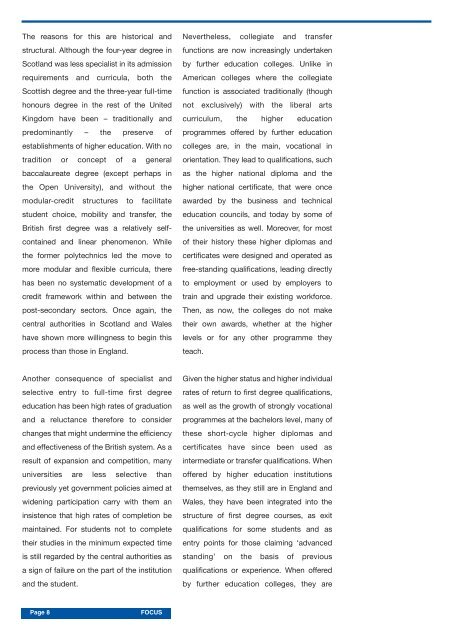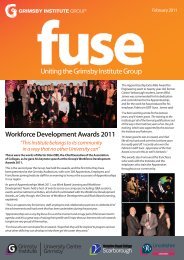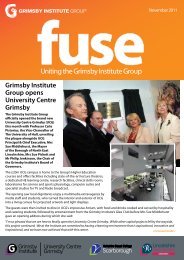Journal of Research & Scholarly Output 2006 - Grimsby Institute of ...
Journal of Research & Scholarly Output 2006 - Grimsby Institute of ...
Journal of Research & Scholarly Output 2006 - Grimsby Institute of ...
You also want an ePaper? Increase the reach of your titles
YUMPU automatically turns print PDFs into web optimized ePapers that Google loves.
The reasons for this are historical and<br />
structural. Although the four-year degree in<br />
Scotland was less specialist in its admission<br />
requirements and curricula, both the<br />
Scottish degree and the three-year full-time<br />
honours degree in the rest <strong>of</strong> the United<br />
Kingdom have been – traditionally and<br />
predominantly – the preserve <strong>of</strong><br />
establishments <strong>of</strong> higher education. With no<br />
tradition or concept <strong>of</strong> a general<br />
baccalaureate degree (except perhaps in<br />
the Open University), and without the<br />
modular-credit structures to facilitate<br />
student choice, mobility and transfer, the<br />
British first degree was a relatively selfcontained<br />
and linear phenomenon. While<br />
the former polytechnics led the move to<br />
more modular and flexible curricula, there<br />
has been no systematic development <strong>of</strong> a<br />
credit framework within and between the<br />
post-secondary sectors. Once again, the<br />
central authorities in Scotland and Wales<br />
have shown more willingness to begin this<br />
process than those in England.<br />
Nevertheless, collegiate and transfer<br />
functions are now increasingly undertaken<br />
by further education colleges. Unlike in<br />
American colleges where the collegiate<br />
function is associated traditionally (though<br />
not exclusively) with the liberal arts<br />
curriculum, the higher education<br />
programmes <strong>of</strong>fered by further education<br />
colleges are, in the main, vocational in<br />
orientation. They lead to qualifications, such<br />
as the higher national diploma and the<br />
higher national certificate, that were once<br />
awarded by the business and technical<br />
education councils, and today by some <strong>of</strong><br />
the universities as well. Moreover, for most<br />
<strong>of</strong> their history these higher diplomas and<br />
certificates were designed and operated as<br />
free-standing qualifications, leading directly<br />
to employment or used by employers to<br />
train and upgrade their existing workforce.<br />
Then, as now, the colleges do not make<br />
their own awards, whether at the higher<br />
levels or for any other programme they<br />
teach.<br />
Another consequence <strong>of</strong> specialist and<br />
selective entry to full-time first degree<br />
education has been high rates <strong>of</strong> graduation<br />
and a reluctance therefore to consider<br />
changes that might undermine the efficiency<br />
and effectiveness <strong>of</strong> the British system. As a<br />
result <strong>of</strong> expansion and competition, many<br />
universities are less selective than<br />
previously yet government policies aimed at<br />
widening participation carry with them an<br />
insistence that high rates <strong>of</strong> completion be<br />
maintained. For students not to complete<br />
their studies in the minimum expected time<br />
is still regarded by the central authorities as<br />
a sign <strong>of</strong> failure on the part <strong>of</strong> the institution<br />
and the student.<br />
Given the higher status and higher individual<br />
rates <strong>of</strong> return to first degree qualifications,<br />
as well as the growth <strong>of</strong> strongly vocational<br />
programmes at the bachelors level, many <strong>of</strong><br />
these short-cycle higher diplomas and<br />
certificates have since been used as<br />
intermediate or transfer qualifications. When<br />
<strong>of</strong>fered by higher education institutions<br />
themselves, as they still are in England and<br />
Wales, they have been integrated into the<br />
structure <strong>of</strong> first degree courses, as exit<br />
qualifications for some students and as<br />
entry points for those claiming ‘advanced<br />
standing’ on the basis <strong>of</strong> previous<br />
qualifications or experience. When <strong>of</strong>fered<br />
by further education colleges, they are<br />
Page 8<br />
FOCUS

















